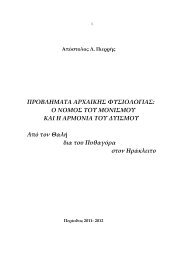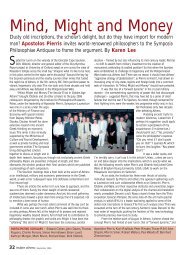Commentary on the Beginning of Damascius' De Primis Principiis
Commentary on the Beginning of Damascius' De Primis Principiis
Commentary on the Beginning of Damascius' De Primis Principiis
Create successful ePaper yourself
Turn your PDF publications into a flip-book with our unique Google optimized e-Paper software.
29*7.9-9.10. The Ultimate Ground was found to be ineffable and inc<strong>on</strong>ceivable.But our anguish in trying to grasp, in however enfeebled a way, <strong>the</strong> One lead s in <strong>the</strong>same result; our attempts are like birth-pangs without birth; <strong>the</strong>y suffer περιτροπή(as it was explained above): <strong>the</strong> One must also be ineffabl e – and th is is supportedby highest authority.But if so, in positing a reality higher than that <strong>of</strong> <strong>the</strong> One are we positingsomething bey<strong>on</strong>d <strong>the</strong> ineffable which <strong>the</strong> One is? Are we not mistakenly striving fora squared so to speak ineffability?D. counters this objecti<strong>on</strong> by 1) interpreting <strong>the</strong> Parmenides passage(brought forward as evidence for <strong>the</strong> objecti<strong>on</strong>) in a way c<strong>on</strong>s<strong>on</strong>ant with his view(7.15-8.17); and 2) explaining that <strong>the</strong> inc<strong>on</strong>ceivability and ineffability <strong>of</strong> <strong>the</strong> ultimateground is absolute, whereas that <strong>of</strong> <strong>the</strong> One is in a certain (very important, <strong>of</strong>course) sense. This sec<strong>on</strong>d c<strong>on</strong>tenti<strong>on</strong> naturally leads to <strong>the</strong> l<strong>on</strong>g developmentbeginning <strong>on</strong> 9.11 about <strong>the</strong> precise sense <strong>of</strong> <strong>the</strong> absolute unknowability <strong>of</strong> <strong>the</strong>Ultimate.7.11. Parmenides 141e- 142a. Rightly Chaignet (p. 12, n. 4) corrects R. ’sabsurd reference to Parm. 160b.7.15-18. D. ’s interpretati<strong>on</strong> <strong>of</strong> Parm., differs in many respects from <strong>the</strong>Neoplat<strong>on</strong>ic Orthodoxy finally formulated and established by Proclus [59]. One suchdifference, affecting <strong>the</strong> overa ll scheme and setting D. quite apart from all hispredecessors [60], is D. ’s c<strong>on</strong>tenti<strong>on</strong> that <strong>the</strong> first Parmenidean Hypo<strong>the</strong>sis does notrelate to <strong>the</strong> absolutely primal principle, but <strong>on</strong>ly to <strong>the</strong> One. In a sense D. agreeswith all his predecessors; but this agreement, seen in <strong>the</strong> c<strong>on</strong>text <strong>of</strong> his positing aPrinciple superior to <strong>the</strong> One, turns to be substantial disagreement.We shall come back again to this point in commenting <strong>on</strong> 37.26 sqq. below.But we reserve <strong>the</strong> detailed comparative treatment <strong>of</strong> <strong>the</strong> main Ne oplat<strong>on</strong>ic answersto <strong>the</strong> questi<strong>on</strong> about <strong>the</strong> highest Principles (those above Being) for <strong>the</strong> third secti<strong>on</strong><strong>of</strong> this work.According to D., Plato wishes us (without explicitly stating it) to apply hisprocedure for arriving at <strong>the</strong> One, in order to transcend th e One itself. By <strong>the</strong>negati<strong>on</strong> <strong>of</strong> every definite determinate reality he led us to <strong>the</strong> One; he expcects us to










